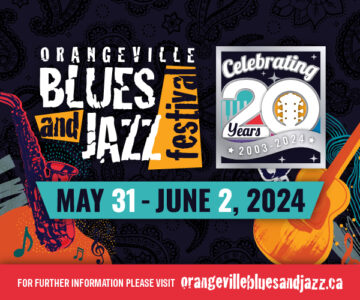Orangeville’s “Stolen” Election
Angry crowds, a mishandled ballot box, cries of voter suppression and a legal challenge rocked the election for Orangeville’s reeve in 1909.
Late in the evening of January 4, 1909 – annual election day – the Orangeville Citizens’ Band led a whooping and hollering crowd through town to the home of Thomas Smith Hewson to tell him the ballots had been counted and he’d been elected reeve.
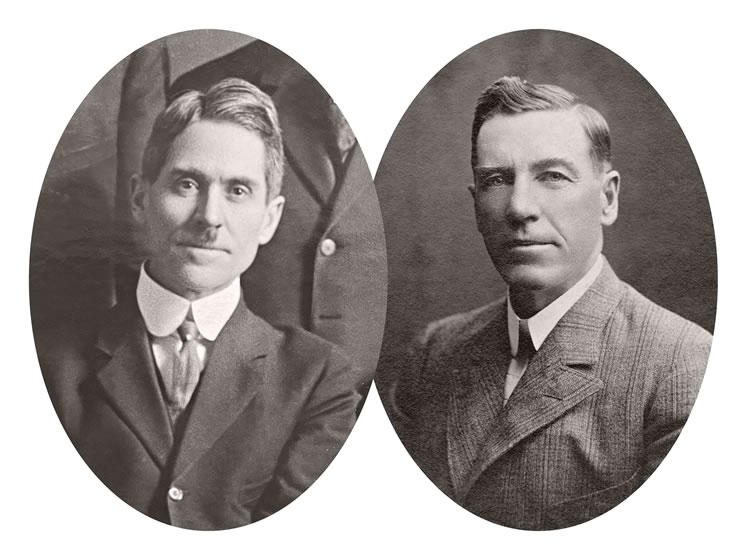
Duelling candidates Thomas Smith Hewson (left) and William Henry Riddell. Photo Courtesy Museum of Dufferin Archives.
It had been a close shave. Hewson had defeated the incumbent reeve, Dr. William Henry Riddell, by a mere four votes! Still, a win is a win, and from his front porch, a beaming Hewson, caught up in the enthusiasm of his noisy supporters, told the gathering how proud he was to be Orangeville’s new mayor [sic] and handed the Citizens’ Band a five dollar tip.
Encouraged by this unexpected generosity, the revellers hurried off to try their luck at the homes of other victors on the slate, leaving Hewson’s supporters to hear a disturbing update from a late arrival.
It seems the band had only picked up results from the north and south wards, so were unaware that the returning officer in the west ward had restored two spoiled ballots to the Riddell ticket, while in the east ward, a mistake had been corrected to give Riddell two votes originally marked for Hewson. This meant the actual winner – and reeve-elect for 1909 – was W.H. Riddell by a margin of two.
An inevitable protest
The angry outcry from Hewson’s supporters was no surprise. Although the 1909 municipal election had been a calm affair – Mayor McKitrick was acclaimed and the town’s six councillors along with the deputy reeve had all won in campaigns marked by mutual respect – the contest for reeve had been a boisterous exception.
All the ruckus had come from one camp. In an overabundance of confidence, Dr. Riddell, a veterinarian and widely respected horseman, had not bothered to campaign, while Mr. Hewson, a local blacksmith and respected town councillor, had pulled out all the stops, backed by a cadre of raucous supporters who clearly believed he was the better choice.
Hewson was not the type to accept a narrow defeat easily, and over the next few days fact and rumour combined to reinforce a conviction that victory had really been his.
A slim two-vote margin automatically triggered a recount and the town clerk prepared to act that very night. Over the next few days, three official recounts confirmed Riddell’s slim victory. However, the findings did nothing to quell rumours that voters had been intimidated by aggressive scrutineers (an accusation made by both sides) and that voting booths had been poorly managed.
Most controversial was the discovery that the elderly returning officer in charge of the west ward had not turned in the ballot box as protocol required, but had taken it home. Arguably, he had made an innocent mistake, but suspicions were further aroused when it was revealed that two voters from the ward had visited his house late on election night.
The incident gave fuel to Hewson’s accusations, not only transforming a close election into a dubious one, but casting a shadow over the entire elected slate as well. In February, as expected, the Hewson camp launched a challenge that turned the validity of the election into a legal matter.
Do it over!
Both parties engaged counsel from Orangeville and Toronto, and both had enough witnesses and affidavits to make for a lengthy and complex hearing. Yet the ruling that came down in mid-May was limited and very specific. Because of the mishandled ballot box, the January 4 election for reeve was declared void, and a new one was ordered. All other elected positions were allowed to stand and – important to the community’s future peace – allegations from both sides about voter suppression and other irregularities were not mentioned.
That future peace took a while to materialize. Riddell and Hewson had to be nominated once again for the new election and the public meeting held to accomplish this was marked by unrestrained partisanship. (The chair of the meeting, Dr. Tom Henry Jr., despite the required neutrality of the position, told the noisy crowd he was voting for Riddell!) Ironically, according to the Orangeville Sun, the only consensus that emerged from the heckling and booing was that the town acquired a reputation for holding badly managed elections.
This perception seems to have affected the new election held on June 7 when adherence to proper procedures was rigorous. Ballot boxes got special attention and voting protocols were observed precisely. (The Orangeville Banner deemed it worth reporting that voters were allowed into booths only one at a time!)
By the end of a glitch-free day, after all the votes had been counted – very carefully – W.H. Riddell had carried all four wards by a margin of 94, emphatically settling who would be reeve for 1909. But a key question remained. Had the divisive “stolen” election left a bad taste in the community?
The legacy
A scan of press coverage over the next several municipal elections suggests it had not, despite lingering discord between Hewson and Riddell. The two men were often philosophically at odds on policy (not least on prohibition and temperance) and they had different positions on governance. Yet it seems they found enough common ground to get them and their supporters past it. Both names regularly show up in support of projects like the Orangeville Fair, paving the town’s streets, etc. The election conflict never seemed to merit mention again – at least in the press. Indeed, each of the men later made successful runs for mayor with neither opposing the other, Riddell the very next year and Hewson twice in the 1920s.
The number of ballots cast in the June rerun may also be telling. It was almost identical to that in January, suggesting the controversy had not made voters cynical. If letters to the editor are an indication, the local citizenry was more bothered by the existence of the disagreement than by its substance, along with the fact that as taxpayers they’d had to bear the cost, possibly as much as $100, of holding a second election.
Nevertheless, there was one player in the 1909 election drama who might have enjoyed a continuation of the dispute – Orangeville Sun editor John Foley. A full-throated supporter of Riddell, Foley had been especially harsh toward the Hewson camp (see sidebar) and now had to dial back. Still, he did get in one last dig. In his told-you-so account of Riddell’s victory in June, he suggested Hewson should ask the Citizens’ Band for his five dollars back.
More Info
Then and now
Municipal elections in Ontario today are held every four years, but for years following Confederation the frequency was yearly, with voting usually in early January.
A municipality may have a mayor or reeve as head of local government. It may also have both, as Orangeville did in 1909. In such cases, mayor is the higher rank, but the arrangement is rare today. Historically, smaller rural communities have been headed by reeves and larger urban ones by mayors, but in recent times the office of reeve has often been set aside in favour of mayor.
Punch-up on Broadway
Thomas Smith Hewson was not the only politician that Orangeville Sun editor John Foley roasted in print. Foley also published less than positive opinions about Thomas Arnott, the successful 1909 candidate for deputy reeve. When Arnott called in at the Sun after the election, ostensibly to pay his yearly subscription to the paper, the visit turned into a spat, then a challenge to “take it outside,” and finally an awkward set-to on Broadway. Foley duly reported the incident on the front page of the next issue and noted that Mr. Arnott had now cancelled his subscription to the Sun.
Related Stories
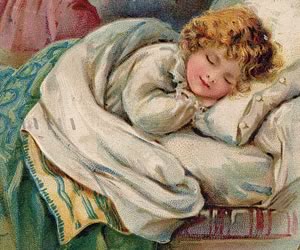
Was Christmas ever ‘Old-Fashioned’?
Nov 20, 2010 | | Historic HillsChristmas was once a simple season of carolling and school concerts, of neighbourly greetings and family visits, of tinkling bells and sleigh rides in gently falling snow, all blessedly free of commercial pressure. Well, maybe.
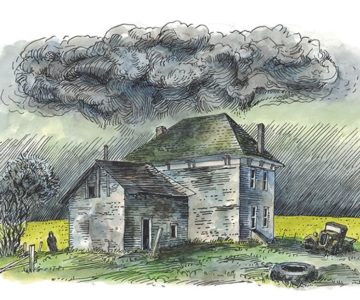
‘Spooks’ In the Hills
Sep 24, 2021 | | Historic HillsIn 1930, a series of strange physical disturbances led a family to abandon their farm in Mulmur Township. Was a spirit at work? A poltergeist? Was it real?
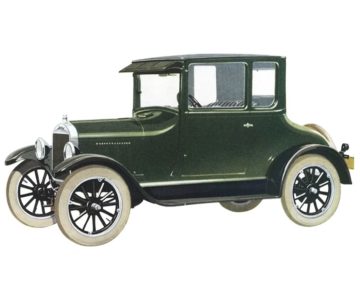
The Auto Takes Hold
Jun 22, 2021 | | Historic HillsIn less than two decades automobiles grew from curiosity to commonplace in these hills.
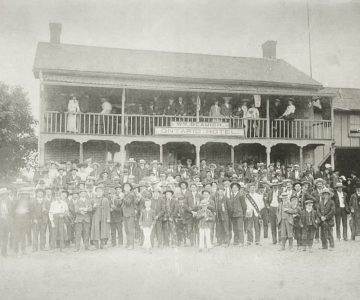
The Orange and the Green: A Legacy of Distrust
Mar 31, 2021 | | Historic HillsAnimus between Protestants and Catholics brewed among early settlers in Headwaters.
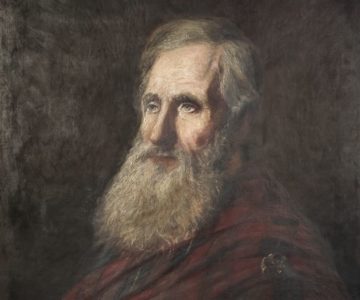
Alexander McLachlan: Our Forgotten Poet
Nov 24, 2020 | | Historic HillsA century ago Alexander McLachlan was one of the best known citizens of these hills, widely admired, respected and praised for his poetry. Today hardly anyone has heard of him. How did this happen?
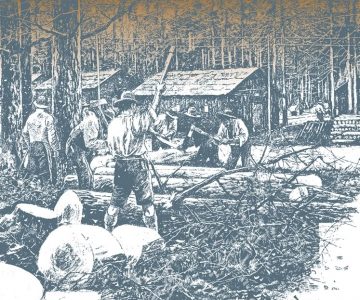
The Trees Had to Go!
Sep 18, 2020 | | Historic HillsSettlers in the 19th century came here to farm, and to do that they had to clear the trees. Their success with that was thorough and dramatic. So was the impact on the landscape.

